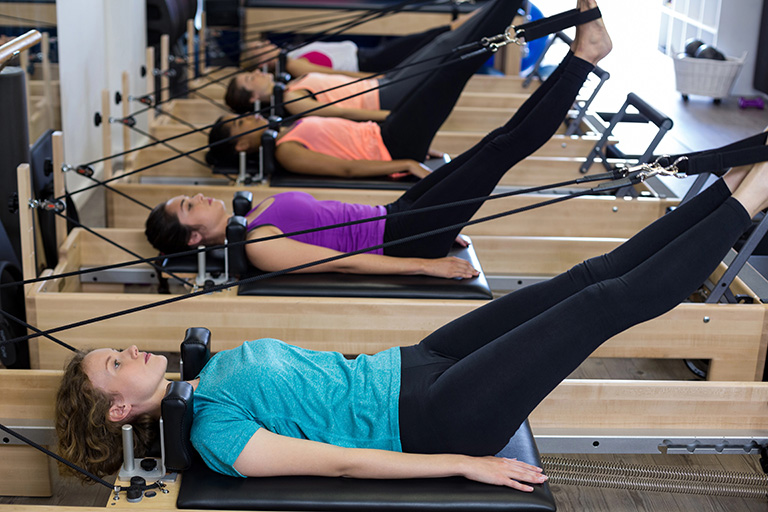Running a Pilates studio can be rewarding, offering clients a chance to improve their health and well-being. However, like any business, it comes with risks. These risks may involve potential injuries, property damage, or even lawsuits that could impact your studio’s financial stability. Like many other fitness facilities, Pilates studios need insurance to safeguard against these risks. In this guide, we’ll explore the importance of Pilates studio insurance, the different types available, and how to choose the right policy for your business.

Why Pilates Studios Need Insurance
Pilates studios, whether large or small, face unique risks that can lead to significant financial loss. If someone gets injured during a session, for instance, they could sue the studio for medical costs, lost wages, or emotional distress. Without proper insurance, the financial burden of such a lawsuit could be crippling.
Beyond injuries, there are other risks to consider. What if equipment breaks or a fire damages the building? Insurance can cover the cost of repairs or replacements, allowing the business to keep running smoothly. Having insurance offers peace of mind, knowing that your Pilates studio is protected against unexpected events.
Types of Pilates Studio Insurance
There are various types of insurance that Pilates studio owners should consider. Each type serves a different purpose and covers a different set of risks. Let’s go over the main types:
General Liability Insurance
General liability insurance is one of the most important policies for any Pilates studio. This type of insurance covers claims of bodily injury, property damage, and personal injury that occur on your premises. For example, if a client slips and falls in your studio, general liability insurance can help cover medical costs and legal fees if they decide to sue.
Professional Liability Insurance
In addition to general liability, Pilates instructors should consider professional liability insurance. This policy protects the studio if a client claims that they were injured due to improper instruction or negligence on the part of the instructor. For example, if a client claims that your advice caused an injury or aggravated a condition, this insurance will help cover legal fees and any damages awarded.
Commercial Property Insurance
Commercial property insurance covers damage to your studio’s physical space and equipment. This includes damage caused by fire, theft, vandalism, or certain natural disasters. If you rent or own your studio space, this insurance can help cover the costs of repairs or replacing damaged equipment like Pilates reformers, mats, and other essential tools.
Workers’ Compensation Insurance
If your Pilates studio employs staff, such as instructors or receptionists, you will likely be required by law to have workers’ compensation insurance. This insurance covers medical expenses and lost wages if an employee gets injured or sick on the job. It also helps protect you from lawsuits filed by injured employees.
Business Interruption Insurance
Business interruption insurance is designed to cover lost income if your studio is forced to close temporarily due to a covered event, such as a fire or natural disaster. This type of insurance can help you continue to pay your bills, such as rent and employee salaries, even if your studio isn’t generating revenue during the closure.
Equipment Breakdown Insurance
Pilates studios rely heavily on specialized equipment like reformers, stability chairs, and barrels. If this equipment breaks down due to mechanical failure or electrical issues, it could lead to a significant financial burden. Equipment breakdown insurance covers the cost of repairs or replacements, minimizing downtime and keeping your studio running efficiently.
Also Read: Top 8 Reasons to Have Pilates Studio Insurance
How To Choose The Right Insurance For Your Pilates Studio

Selecting the right insurance for your Pilates studio depends on a variety of factors, including the size of your studio, the number of clients you serve, and whether you offer any additional services, like online classes or private instruction. Here are some steps to help you choose the right insurance:
1. Assess Your Risks
Start by evaluating the risks your studio faces. Do you have a large client base that increases the chances of an injury claim? Do you rent or own your space? Understanding your specific risks will help you determine which types of insurance are essential.
2. Understand Legal Requirements
Depending on where your studio is located, certain types of insurance may be legally required. For example, workers’ compensation is mandatory in many states if you have employees. Be sure to research your local regulations to ensure compliance.
3. Consult NEXO
NEXO is an insurance broker specializing in fitness or Pilates studios. They are a valuable resource for fitness business owners. They can help you understand the types of coverage you need and recommend policies that fit your budget and risk profile.
4. Compare Coverage Options
Don’t settle for the first insurance policy you find. Compare different options to ensure you’re getting the best coverage for your money. Be sure to look at policy limits, deductibles, and exclusions to fully understand what is covered and what isn’t.
5. Review Your Policy Annually
As your studio grows and changes, your insurance needs may evolve. Make it a habit to review your policy annually and adjust your coverage as needed. For example, if you hire more staff, expand your studio, or add new services, you may need to increase your coverage limits or add new types of insurance.
Also Read: Common Challenges Pilates Studio Owners Face
The Cost of Pilates Studio Insurance
The cost of insurance for Pilates studios varies based on several factors, including the size of your studio, the number of employees, the types of coverage you need, and the location of your business. On average, Pilates studios can expect to pay between $500 and $1,500 per year for general liability insurance alone. However, this cost can increase significantly if you add additional coverage, such as professional liability, workers’ compensation, or business interruption insurance.
To get an accurate estimate of your insurance costs, it’s best to request quotes from multiple insurance providers. Be sure to provide detailed information about your business, such as the number of clients you serve, the type of equipment you use, and any special services you offer, as this can affect your premiums.
Insurance is a crucial part of running a successful Pilates studio. It protects your business from unexpected events, such as client injuries, property damage, or lawsuits, and ensures that you can continue to operate even in the face of adversity. By understanding the different types of Pilates studio insurance available and carefully assessing your studio’s risks, you can choose the right policies to protect your business and give you peace of mind. Regularly reviewing and updating your coverage will help ensure that your Pilates studio remains protected as it grows and evolves.
💡Deep dive this topic: The Importance of Professional Liability Insurance for Pilates Instructors
💡Deep dive this topic: Workers’ Compensation Insurance for Pilates Studios: What You Need to Know
💡Deep dive this topic: Protecting Your Pilates Studio Equipment with Property Insurance
NEXO is here for all your fitness business insurance needs. Contact us today to review policy and coverage options for your Pilates studio.